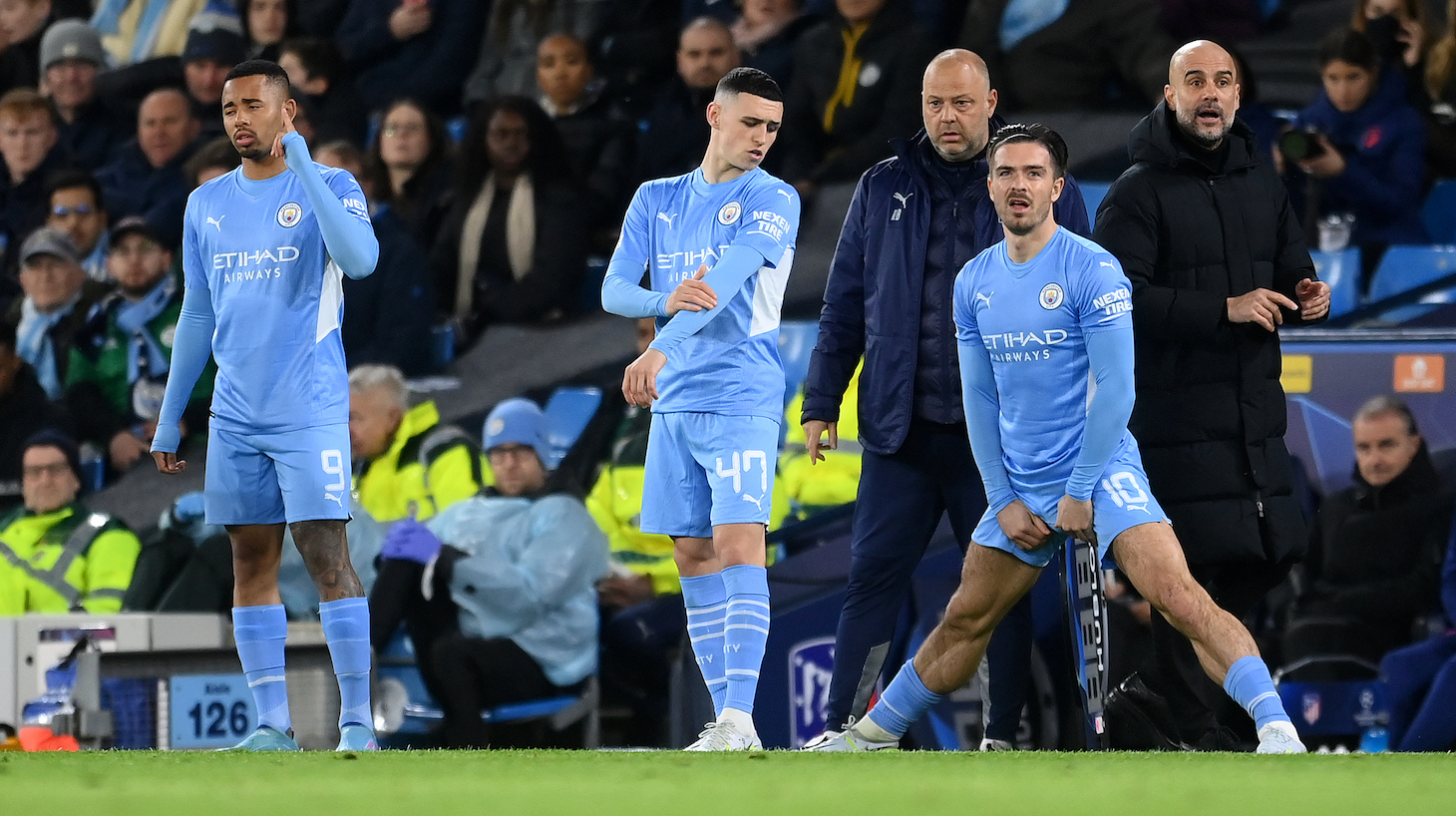Pep Guardiola and Diego Simeone might be the two biggest control freaks in all of soccer. The pair of managers share an obsession with and an unwavering commitment to their demanding playing philosophies, both of which impose strict roles on each player in an effort to comprehensively, systematically, and consistently dominate play. Their respective visions of domination are diametric opposites. Though both seek to control space and the pace of play, Guardiola tries to accomplish this through attacking positioning and sustained possession, while Simeone does it with defensive positioning and brief, fast, vertical counter-attacks. Both have been incredibly successful. The primary role their respective playing philosophies have in that success has made both of them the protagonists of their clubs, the cinematic auteurs to whom all that happens on screen is attributed.
The Champions League quarterfinal tie between Guardiola's Manchester City and Simeone's Atlético Madrid made for an intriguing clash of not just teams and players but of ideas and visions. Far more than it was Kevin De Bruyne vs. Antoine Griezmann, the major conflicts of the tie felt like Pep vs. Cholo, attacking vs. defending, proactivity vs. reactivity, idealism vs. pragmatism, an unstoppable force vs. an immovable object. Tuesday's first leg was instructive, supporting some of those preconceptions while undermining others. Mostly, the game reminded us that no matter how great the managers are, or how determinative the tactical structure imposed from the sidelines can prove, soccer remains a game first and foremost of the players, and is all the better for it.
I'm just going to come out and say it: Tuesday's match was, for the most part, boring as hell. Sure, from an intellectual point of view, there was a lot to dig into from the collision of Guardiola's and Simeone's styles, which in confrontation with one another reached their respective radical extremes. There was Atlético's hyper-defensive 5–5–0 formation, City's second-half hyper-offensive 3–1–6 response, both managers' attempts to either contain or unleash full back orchestrator João Cancelo, and the critical substitutions which changed the nature of the game. As advertised, the game really was a chess match between two grandmasters playing at a stalemate. Like a real chess match, you had to be a total weirdo to find it fun to watch.
Thankfully, the second half was a little livelier than the first. This was due in large part to both teams' attacking substitutes, whose introduction into the proceedings loosened the two managers' grip on the match and allowed an actual game to break out. No one deserves more credit for this than Phil Foden.
In the 60th minute, no doubt elated with his team's success in smothering any City attack before it could draw breath during the miserable, scoreless first hour of play, Simeone made a trio of somewhat more forward-minded substitutions with an eye toward maybe snatching a goal in the final half hour. Eight minutes later, Guardiola brought on three fresh attackers of his own, including Foden. Inside just two minutes, Foden gave the match what it had been desperate for: a touch of individual inspiration, talent, anarchy, and excitement. All of that is what he brought on his killer assist for De Bruyne's winning goal:
Foden's willingness and ability to deviate from the script Guardiola and Simeone had been writing gave the second half, and thus the game, all its best moments. No coach's diagram can make a player able to attract four defenders with his sense for positioning, then resist those defenders' advances as they bear down on him, then release a masterfully weighted through ball between one defender's legs, which goes on to create a goal. Players make goals, and goals make the game. Guardiola may have provided Foden the platform, but it was the player himself who did all the good stuff.
Along with making the game, goals also change games far more profoundly than some guy shouting from the sidelines can. Which is why, after City took the lead, the match lost most of the structure under which it had been played for the prior hour. The game became an open one with both sets of players pushing forward in attack, trying to recreate the brilliance and impact of Foden's goal-making play. For a good 10 or 15 minutes, the shackles were off, and the chess pieces reclaimed their own autonomy and did what they wanted. And once again Foden stood at the fore, creating a couple more chances with his inventive dribbling and passing that easily could've extended City's lead.
Before the end, though, both managers reasserted control, and the match regained the tenor of the pre-goal period. By the final whistle, the 1–0 scoreline was probably simultaneously encouraging and disappointing for both managers, each of whom more or less got what they wanted out of the game, but not quite as fully as they would've liked.
A match like Tuesday's can be a good corrective for some of the more restrictive and dogmatic interpretations of soccer. Was Simeone really any more "pragmatic" or "reactive" than Guardiola, when for a solid hour the game was played according to the exact terms Simeone proposed? Does it make sense to consider Simeone necessarily more "conservative" or even "defensive" than Guardiola, when the latter's ball hogging was done with the express purpose of playing it safe by not letting Atlético get free for a dangerous counter? Coaches pick the lineups and set the strategy and give the instructions, but can they ever really be in control of what happens, especially of what's most important?
If anyone considered the answers to those questions self-evident before the match, Tuesday's show should've complicated all of them—except, hopefully, the last one. Hopefully everyone already knew that what's best about soccer comes about because of the players, and for that, the City-Atleti showdown was just more evidence, once Foden came on and did what needed doing.






